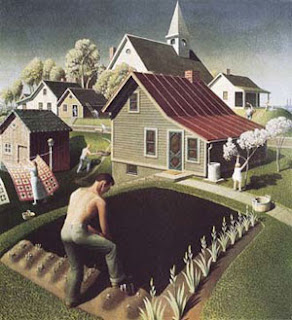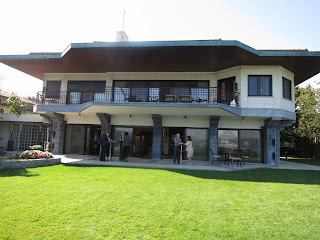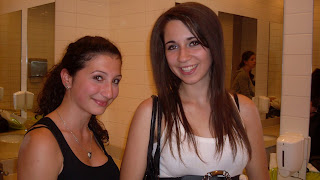American ladies arriving at the entrance.
Jennie Toner, far right and front
with eight colleagues.
Every year, the Professional American Women of Istanbul are invited to the home of America's Consul General in Istanbul. The title of Consul General refers to America's highest diplomat in an important city that isn't the capital city.
I had no expectations of what it would be like but, I was especially looking forward to this, as I have two friends who have served as America's Consul General around the world.
One friend served in Perth, Australia, and another friend served in Mumbai, India. I was never able to visit them while they held those posts so I thought my visit to the Kilner's residence might give me a feeling for what my friends' lives were like when they served. Now one of my friends has become an American ambassador, but he's in a country so off the commercial beaten path and expensive to visit, he's going to retire without me ever having visited him and his family in their country of service.
Hope Mandel and her friend Christy.
Hope is here in Istanbul
working for the Nielsen Company
as a Client Business Partner.
It's hard to see in this photo,
but this was a lovely view of the church
in the background.
Weekends in Istanbul have been spectacular this fall, that Saturday morning was no different. The U.S. Consul residence is in the Arnavutköy neighborhood. I haven't explored this neighborhood yet, but need to do so soon, as a simple walk through one day told me it was adorable. The streets give an old Ottoman feeling of close wooden houses with overhanging second stories. At the windows of many homes are beautiful flowers. About twelve of us American ladies met that morning and took a taxi from Besiktas to the residence and it was quite an adventure finding the home in Arnavutköy and getting there.
Me, stopping to take a picture
in celebration of the peaceful feeling
of the grounds
A view of the back of the house.
A lawn like this
is a very rare thing in Istanbul.
Enjoying brunch and conversation
on the back porch
A lovely place to sit in the back yard
and enjoy the view of shipping traffic
passing through the Bosphorus.
I find it impossible to tire of watching the ships
go through. They are magnificent.
U.S. Consul General Scott Kilner
and Vanessa H. Larson,
managing editor of the new global start-up
Culinary Backstreets.
The both speak fluent Turkish, being experienced Turkophiles,
but here they are speaking English.
Enjoying the morning
Me with Adrian Hodges,
Adrian is a newlywed bursting with joy.
Helene Bumbalo is just beginning her expat adventure.
She is quickly becoming an expert on teaching
"Aviation English."
We had fun and were inspired!
Mrs. Kilner welcomed us to her home and I made a point of thanking her for her service to our country. I think it is important to acknowledge the service supportive spouses give America when they are married to people who serve America professionally, because those spouses do so at considerable sacrifice to their own careers. They don't often get to choose where they will live or how long they will be there. A simple acknowledgement of this gift they give us seems like an important thing to do, don't you agree? I think it's important to say to military spouses and children too.
Everything about the morning made me so proud of my country and American values. I appreciated that the house was grand, like my nation, but our representatives were wonderfully down-to-earth and approachable. I appreciated the two Marines who were present to invite us to their annual Marine Corps ball. I loved the helpful attitude of the consular staff as they worked to answer questions about voting issues and general safety issues. I appreciated how deeply knowledgeable our Consul General is about Turkey and how much time the Kilners have in the country having served in three different posts: Adana, Ankara, and Istanbul.
When I was telling one of my Turkish girlfriends about our morning at the Consul General's house, she said, "I would have to get my hair done for that and get a new dress. It would be impossible to go without maximum effort." I think she was shocked to learn that many Americans felt comfortable going in jeans. It was a Saturday morning, for heaven's sake! I like that we Americans don't always feel the need to dress to impress and could just enjoy each other as authentically as possible.
Sometimes though, Americans can take casual too far. Ninety-five of us R.S.V.P.ed and said we would come and only 55 showed up.
Istanbul is an especially intense post, maybe one of the most intense in the world, due to Turkey's strategic position and regional issues. I believe the Secretary of State has come to Istanbul four times over the past year on business, which doesn't usually happen at consular posts.
After we had enjoyed brunch, Mr. Kilner gave us a 20-minute overview of issues affecting the region. I think there is an etiquette rule that if you go to the White House, you shouldn't repeat everything the President said, otherwise he or she never feels free to talk. So I will extend that same courtesy to Mr. Kilner, as his office has incredibly complex issues in their hands regarding Syria and surrounding international tension. I am sure that "sober" is a word that is completely overused in diplomatic circles, but I felt reassured, as best as an ordinary citizen can feel reassured, that my government is approaching these issues with thoughtful sobriety.
After we left that day, a bunch of us were riding the bus back to central Istanbul, and one of the ladies who had been a foreign service wife told us that before 1970, foreign service wives used to be rated on how much charity work they did, on their entertaining, etc. Imagine! They weren't even paid or held a position, but the U.S. government felt free to rate them.
People like Mrs. Kilner who support their spouse in representing our country are now a disappearing species, as many spouses choose to have their own career. I'm grateful for both the Kilners and appreciated the opportunity to see how my beloved nation is represented in Istanbul.
Several photos courtesy of Hope Mandel.
Follow me on Facebook at Empty Nest Expat























































 Who links to me?
Who links to me?
